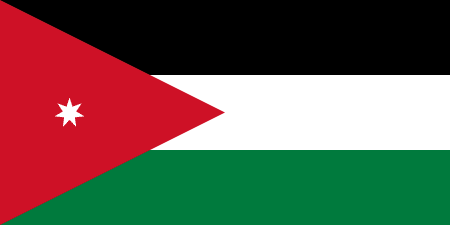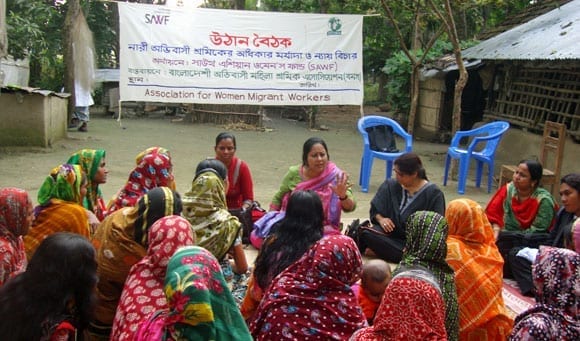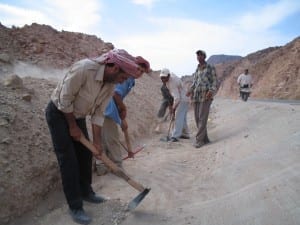
Nov 17, 2014
Tayel Alkhamayseh, president of the Independent Union of Phosphates Workers in Jordan, returned to his job this month after worker and human rights organizations denounced his November 6 arrest and suspension, pressed for his reinstatement and decried his arrest as a move to prevent unionization at the plant.
The Jordanian Federation of Independent Trade Unions (JFITU) sent letters protesting his detention to the Ministry of Labor and company management. The National Center for Human Rights and Jordanian civil society organizations generated additional support for Alkhamayseh, who was reinstated after a meeting with management in which it was established that he had no intention of declaring a strike.
The Phosphate Workers Union is affiliated to the JFITU, which is campaigning for the Jordanian government to adopt legislation to allow full freedom of association for all workers.
The JFITU says Alkhamayseh’s arrest and suspension indicate continuing pressure to restrict the practice of independent trade unionism in Jordan. The federation notes that his reinstatement is an important demonstration of Jordanian support for independent trade unionism.
The federation formed last year, when nine unions representing more than 7,000 workers joined forces to mobilize for improved economic conditions and greater political freedom.
Alkhamayseh, an engineer, works in the White Valley phosphate mine near Karak in the south of Jordan. As president of the workers’ union in Karak, he organized a meeting that included workers from several branches of the same company. Management then suspended Alkhamayseh and accused him of inciting a strike. In response, workers organized a protest and work stoppage.

Sep 19, 2014
Three times each month, dozens of women gather in dusty courtyards in rural towns in Manikganj, Dinazpur or other districts across Bangladesh to learn all they can about the only means by which they can support their families: migrating to another country for work.
In leading these information sessions, the Bangladesh Migrant Women’s Organization (BOMSA) seeks to assist women in understanding their rights—from what they should demand of those who facilitate their migration, to the wage and working conditions at the homes in Gulf and Asian countries where they will be employed as domestic workers.
“What I want for these women is that they are safe, they get their wages,” said Sheikh Rumana, BOMSA general secretary. Rumana founded the organization in 1998 with other women who worked with her for years in Malaysian garment factories. Before she migrated for work in Malaysia, Rumana was promised a good salary at an electronics plant. But when she arrived, she was put to work at a plant making jackets and paid pennies for each piece she sewed.
The gap between the promise and reality of migrating for work overseas is the focus of migrant worker activists across Asia. This month, Rumana and seven other migrant worker activists from Bangladesh, India and the Maldives are traveling across the United States as part of a Solidarity Center exchange program supported by the U.S. State Department. The group is meeting with U.S. activists working on labor rights, migrant rights and anti-human trafficking issues in Washington, D.C., New York and Los Angeles to discuss best practices to promote safe migration and share ideas for raising awareness about the risks of migrating for work.
Like BOMSA, the Welfare Association for the Rights of Bangladeshi Emigrants Development Foundation (WARBE-DF) assists those seeking to migrate, provides support for workers overseas and assists them upon their return. The organization also has successfully pushed the Bangladeshi government to ratify the United Nations (UN) convention on the protection of migrant workers, and is campaigning for passage of the International Labor Organization (ILO) convention covering decent work for domestic workers, said Jasiya Khatoon, WARBE-DF program coordinator and Solidarity Center exchange participant.
“Lack of job opportunities” is what drives millions of Bangladeshis out of their country in search of work, Khatoon said. Some 8.5 million Bangladeshis are working in more than 150 countries, according to 2013 government statistics.
Many workers migrating from Bangladesh and elsewhere are first trafficked through another country—where a lack of proper documentation may result in their arrest. In Mumbai, India, a transit point for many migrants, human rights lawyer Gayatri Jitendra Singh works both to assist imprisoned migrant workers and to change the country’s laws so that, rather than penalizing migrant workers, the laws recognize the culpability of traffickers and corrupt labor brokers.
Singh, a former union organizer, and other migrant advocates, point to the actions of labor brokers as the biggest underlying problem in the migration process. Many labor brokers charge such exorbitant fees for securing work that migrant workers cannot repay them even after years on the job, essentially rendering them indentured workers. They remain trapped, often forced to remain in dangerous working conditions because their debt is too great. Unscrupulous brokers also lie about the wages and working conditions workers should expect in a destination country, the migrant advocates say.
Singh and the other migrant advocates came to the United States filled with fresh stories about the suffering of migrant workers and their families: a Bangladeshi domestic worker in Jordan and another in Lebanon who had just returned to Bangladesh, still suffering the effects of nightly sexual abuse by their employers; the family of an Indian construction worker who died in Qatar and is unable to pay for the return of his body; the 12-year-old Bangladeshi girl whose passport cites her age as 25 so she can migrate overseas to support her family because her father is ill.
Bangladeshis “wouldn’t go if there were jobs in their country,” said Rumana. But faced with grinding poverty and no chance for decent work in Bangladesh, they uproot their lives to make a living. But as long as they do, Rumana said, they “shouldn’t have to be tortured to have work.
May 15, 2013

A wide range of workers are now part of the new Federation of Independent Trade Unions of Jordan (FITU-J).
Nine unions representing more than 7,000 workers recently held the founding congress of the Federation of Independent Trade Unions of Jordan (FITU-J), demonstrating a concrete commitment to independent trade unionism as workers in Jordan seek to mobilize for greater political freedom, improved economic conditions and strong justice.
The conference theme, “Freedom of Association is a Necessity,” underscored how, as Jordanian workers have participated in multiple labor strikes for the right to form unions over the past four years, they are part of the country’s broader movement for democratic change. Although the Jordanian constitution upholds International Labor Organization (ILO) conventions on freedom of association, Jordanian labor law allows trade unions in only 17 sectors designated by the Ministry of Labor.
During the one-day congress, delegates elected as president Azzam Smadi, retired president of the Independent Phosphates Workers Union. Delegates ratified a constitution and articulated principles and priorities, including the goal to pass legislation expanding access to freedom of association and social security. Conference delegates also demonstrated the importance of involving women in the union movement by establishing the FITU-J women’s committee, headed by Wijdan Abu Ighanam, a member of the independent Electricity Workers Union.
The 218 delegates at the April 26 convention were joined by international guests, including a representative from the United Auto Workers Global Organizing Institute and representatives from the ILO Bureau for Workers’ Activities (ILO-ACTRAV), Public Services International (PSI), and independent unions from Algeria and Kuwait. AFL-CIO President Richard Trumka sent a letter of support and AFL-CIO International Department Director Cathy Feingold taped a video greeting.
The nine participating unions represent workers in the phosphates industry and the pharmaceutical industry and also include electrical workers, land transport drivers, printing press operators, day laborers, agricultural workers, engineers’ assistants and Department of Statistics employees.



